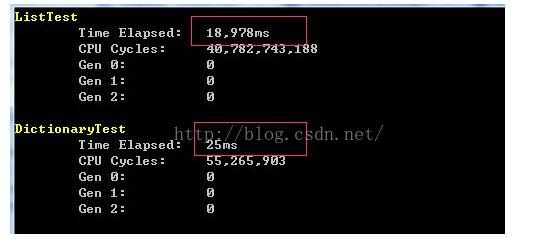【C#】Dictionary和List泛型比较
这几天做项目被一个问题难倒了,不知如何去动手,问了师哥有点小小的收获,给我普及了一下C#中dictionary的用法;我们以前做项目的时候用到最多的就是list泛型,来讲一讲两者的比较吧。
【Dictionary】
在C#中,Dictionary提供快速的基于兼职的元素查找。他的结构是这样的:Dictionary<[key], [value]> ,当你有很多元素的时候可以使用它。它包含在System.Collections.Generic名空间中。在使用前,你必须声明它的键类型和值类型。
Dictionary的描述
1、从一组键(Key)到一组值(Value)的映射,每一个添加项都是由一个值及其相关连的键组成
2、任何键都必须是唯一的
3、键不能为空引用null(VB中的Nothing),若值为引用类型,则可以为空值
4、Key和Value可以是任何类型(string,int,custom class 等)
Dictionary常用用法:
以 key 的类型为 int , value的类型为string 为例
1、创建及初始化:
DictionarymyDictionary=newDictionary();
myDictionary.Add(1,"C#");
myDictionary.Add(2,"C++");
myDictionary.Add(3,"ASP.NET");
myDictionary.Add(4,"MVC");3、通过Key查找元素
if(myDictionary.ContainsKey(1))
{
Console.WriteLine("Key:{0},Value:{1}","1", myDictionary[1]);
}foreach(KeyValuePairkvp in myDictionary)
{
Console.WriteLine("Key = {0}, Value = {1}",kvp.Key, kvp.Value);
} Dictionary.KeyCollection keyCol=myDictionary.Keys;
foreach(intkeyinkeyCol)
{
Console.WriteLine("Key = {0}", key);
} Dictionary.ValueCollection valueCol=myDictionary.Values;
foreach(stringvalueinvalueCol)
.{
Console.WriteLine("Value = {0}", value);
} myDictionary.Remove(1);
if(myDictionary.ContainsKey(1))
{
Console.WriteLine("Key:{0},Value:{1}","1", myDictionary[1]);
}
else{
Console.WriteLine("不存在 Key : 1");
}
【比较】
下面是一个小的程序只是为说明List和Dictionary效率的差别。
///
/// 集合类效率测试
///
public class SetEfficiencyTest
{
static List todayList = InitTodayData();
static List historyList = InitHisoryData();
public static void Run()
{
CodeTimer.Time("ListTest", 1, ListTest);
CodeTimer.Time("DictionaryTest", 1, DictionaryTest);
}
public static void ListTest()
{
List resultList = todayList.FindAll(re =>
{
if (historyList.Exists(m => m.UserID == re.UserID && m.BookID == re.BookID))
{
return false;
}
return true;
});
}
public static void DictionaryTest()
{
Dictionary> bDic = new Dictionary>();
foreach (TestModel obj in historyList)
{
if (!bDic.ContainsKey(obj.UserID))
{
bDic.Add(obj.UserID, new List());
}
bDic[obj.UserID].Add(obj.BookID);
}
List resultList = todayList.FindAll(re =>
{
if (bDic.ContainsKey(re.UserID) && bDic[re.UserID].Contains(re.BookID))
{
return false;
}
return true;
});
}
///
/// 初始化数据(今日)
///
/// InitTodayData()
{
List list = new List();
for (int i = 0; i < 10000; i++)
{
list.Add(new TestModel() { UserID = i, BookID = i.ToString() });
}
return list;
}
///
/// 初始化数据(历史)
///
/// InitHisoryData()
{
List list = new List();
Random r = new Random();
int loopTimes = 60000;
for (int i = 0; i < loopTimes; i++)
{
list.Add(new TestModel() { UserID = r.Next(0, loopTimes), BookID = i.ToString() });
}
return list;
}
///
/// 测试实体
///
public class TestModel
{
///
/// 用户ID
///
public int UserID { get; set; }
///
/// 书ID
///
public string BookID { get; set; }
}
} 输出如下:

真是想不到,两者效率相差这么多。接下来研究下两者差异巨大的原因。
List.Exists()函数的实现:
public bool Exists(Predicate match)
{
return this.FindIndex(match) != -1;
}
public int FindIndex(Predicate match)
{
return this.FindIndex(0, this._size, match);
}
public int FindIndex(int startIndex, int count, Predicate match)
{
if (startIndex > this._size)
{
ThrowHelper.ThrowArgumentOutOfRangeException(ExceptionArgument.startIndex, ExceptionResource.ArgumentOutOfRange_Index);
}
if (count < 0 || startIndex > this._size - count)
{
ThrowHelper.ThrowArgumentOutOfRangeException(ExceptionArgument.count, ExceptionResource.ArgumentOutOfRange_Count);
}
if (match == null)
{
ThrowHelper.ThrowArgumentNullException(ExceptionArgument.match);
}
int num = startIndex + count;
for (int i = startIndex; i < num; i++)
{
if (match(this._items[i]))
{
return i;
}
}
return -1;
} Dictionary.ContainsKey()函数的实现:
public bool ContainsKey(TKey key)
{
return this.FindEntry(key) >= 0;
}
// System.Collections.Generic.Dictionary
private int FindEntry(TKey key)
{
if (key == null)
{
ThrowHelper.ThrowArgumentNullException(ExceptionArgument.key);
}
if (this.buckets != null)
{
int num = this.comparer.GetHashCode(key) & 2147483647;
for (int i = this.buckets[num % this.buckets.Length]; i >= 0; i = this.entries[i].next)
{
if (this.entries[i].hashCode == num && this.comparer.Equals(this.entries[i].key, key))
{
return i;
}
}
}
return -1;
} 【总结】
1.如果需要非常快地添加、删除和查找项目,而且不关心集合中项目的顺序,那么首先应该考虑使Dictionary
2.如果您的使用模式很少需要删除和大量添加,而重要的是保持集合的顺序,那么您仍然可以选择 List
3.如果需要在实现快速插入的同时保持顺序,那么使用新的 LinkedList